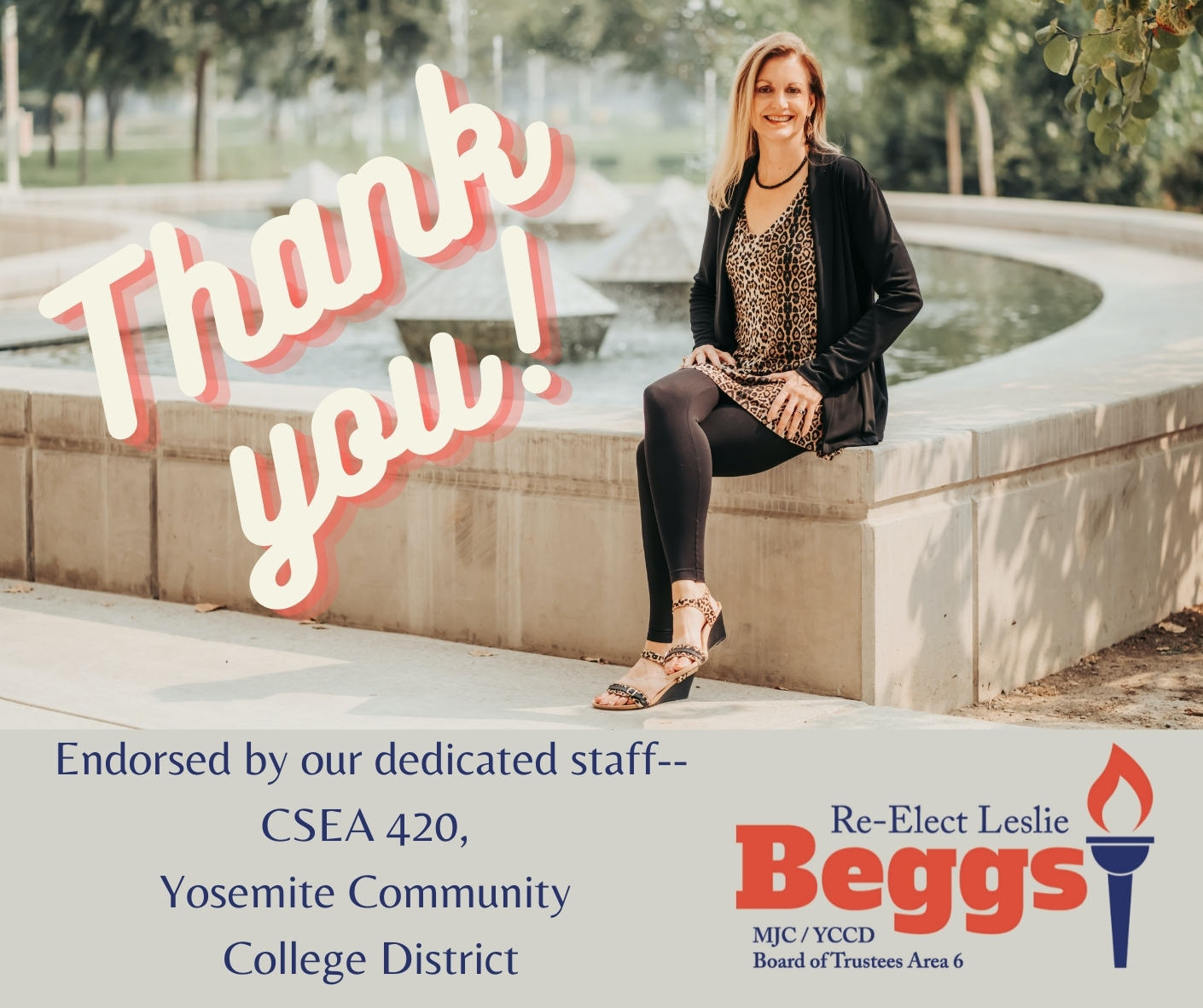CSEA 420 Endorsement
Post-forum questions


I am so grateful to announce that our dedicated staff, so essential in carrying out the mission of our colleges, have endorsed me. I participated in their Candidate Forum and am thankful to have earned their trust. In truth, smooth public speaking is not my ‘thing,’ -- but taking the time to analyze complicated issues, hearing all sides respectfully, and making thoughtful decisions, IS. Below is my response to their post-forum questions:
1. Please share your thoughts on college athletics?
It is lamentable that COVID restrictions have put athletic competitions on hold.
Extracurricular activities, including college athletics, are an integral part of the educational experience. Athletics help students build life skills such as teamwork, perseverance, accountability, and leadership. As a group, our athletes have higher grade-point averages and higher degree completion rates than our general student population. School sports also contribute to overall school spirit, cohesiveness and loyalty to our colleges.
One of MJC’s hallmarks is its 19 athletic programs, the most in Northern California. We have many success stories of student athletes who have gone on to four-year colleges with the help of athletic scholarships. Athletics should be celebrated for their contribution to student success and student satisfaction with the college experience.
My husband was a competitive college athlete (gymnastics) for the University of Georgia, and a gymnastics coach at the high school and college club levels. We both understand the life-long value of the discipline and enjoyment that comes from participation in college athletics.
2. The freshman students are getting worse and worse with basic English. They write in text not basic writing skills - all students. What can MJC do to ensure MJC graduates can write?
As a former English instructor at MJC and the wife of a full-time English instructor, I agree. But allow me to back up a bit and ask two related questions: Has the pressure to show improvement in student success metrics resulted in improved writing proficiency?
Or, do the poor writing skills of incoming freshmen suggest that K-12 is too often choosing “passing” over proficiency?
I don’t want our colleges to follow suit.
While I agree with the goal of AB 705, the unintended consequence is that it’s putting a great deal of pressure on professors to increase student throughput along the English course sequence. I believe that MJC should prefer success, defined as demonstrable competency, over the success that easier content, faster throughput, and/or lower standards temporarily supply.
I take it as a given that our professors and support specialists are doing everything they humanly can to help entering students acquire the requisite skills for college-level writing and analysis. We now provide wrap-around support, utilizing Starfish, DSPS, counseling, tutoring and library services, etc. We have a plethora of robust programs to help students survive and thrive, such as TRIO, ELL and The Bridge. The new Institute for Applied Creativity and Community Transformation (ACCT) will no doubt provide cutting-edge professional development for support staff and faculty, which should in turn improve SLOs.
But will all of these efforts and initiatives be enough to ensure that MJC graduates can write? I don’t know, but I believe that when a student is awarded a degree, one of the things that piece of parchment paper should convey is that the student can write decently.
So what can MJC do? The Academic Senate primarily controls curriculum and grading policies under their 10+1 purview. The Academic Senate could, utilizing its own processes, take a stand that students should demonstrate writing proficiency before graduating.
The Board could -- and in my opinion should -- indicate that we wholeheartedly support the Academic Senate in maintaining high quality academic standards, but we can’t direct it to do so, without being perceived as interfering and “micromanaging.”
Nevertheless, the Board as a governing body has a legitimate interest in protecting the value of our product, a college degree, and we have an obligation to provide our students with the excellent education we have promised them.
As a trustee, I am a tireless advocate both for maintaining academic rigor and ensuring that our faculty and academic staff have the resources they need to help students graduate in a timely manner with the skills and knowledge required to succeed not only at our institution, but in their chosen fields.
3. What strategies would you recommend to identify, intervene and prevent bullying behavior among staff relations?
To identify bullying behavior among staff, we can consult HR and relevant Board policies, such as such as 3430: Prohibition of Harrassment, and 3435: Discrimination & Harrassment Complaints and Investigations. (There are two new Title IX harassment policies in the state pipeline.) Employees may also want to read through the new Due Process Policy (3-8020) to know what their rights are.
To intervene and prevent such toxic conduct, we should continue to lead by example, creating and maintaining a culture that deters would-be bullies, and address bullying where it exists. Our Board actively affirmed The Golden Rule in our 2017-2018 Special Priorities, because we recognize that it is impossible to create a positive educational environment without the mutual respect, trust, and kindness that occurs when we all actively seek to treat others as we would wish to be treated.
4. What is your best trait or skill that will benefit YCCD?
I bring a unique perspective to the Board, in that I am the only trustee (or candidate for trustee this year) who previously worked as a member of YCCD faculty. This experience gives me insight that other board members don’t have, and my connections with faculty and staff have proven invaluable during my first term on the board.
My other strengths include:
- polite, principled persistence. Asserting my right as an elected official to listen to a broad range of perspectives and welcome direct communication with faculty, staff and other stakeholders -- despite the previous administrations’ attempts to stop me -- demonstrates my commitment to fair, fully informed decision-making.
- teamwork, listening, consensus-building and leadership skills. Rather than emphasizing factions, I bring people together and have an established record of working collegially with students, constituent group leaders, my peers, and Chancellor Henry Yong. I also was elected by my colleagues as Vice Chair & Chair, to help guide the board, and the district, through a difficult period
- valuable writing skills. I often have been asked by the Chancellor and committee chairs to rewrite and/or edit resolutions and policies that appear on the Board agenda, all of which have passed.
5. Why should the classified professionals support you and your campaign? Why is CSEA support important to you?
They should support me because I’ve shown that I value their work and expertise and I want them to look forward to coming to work every day. As I said during the forum, classified professionals are indispensable in carrying out our shared mission.
Our institution has one main purpose: to educate students and help them achieve their academic and career goals -- to reach their fullest potential -- so they can leave here and go out to have satisfying careers.
We should have that same desire for those who work here, whether staff, faculty, or management. We should want our employees to feel that their work is meaningful and that we deeply respect and value their contributions to this organization and its purpose. That’s why I’ve always been an advocate, for example, for better working conditions and pay for part-time professors, who are integral to helping our students achieve their goals.
My respect for all employees is also why I favor flexibility whenever feasible. I was an advocate for allowing some staff and management to work from home, if desired, even before COVID. As long as the work is done well and on time, then why not be flexible?
The same concern for all employees, students, and volunteers led Trustee DeMartini and I to spearhead the effort to create our landmark Due Process Policy, mandating fair and consistent treatment in disciplinary proceedings.
CSEA members should also support me because they know I will take the time, whether one on one or in open office-hour settings, to listen respectfully to their concerns and ideas and share them -- with their permission -- with the Chancellor and fellow board members. For example, I had several staff members tell me about an excellent employee who they felt had been overlooked for promotion. I shared that information with the Chancellor and also encouraged the staff members to talk directly to him. They did so, and the outcome has been pretty terrific, benefiting that department and the district as a whole. Knowing they could talk to me without fear of retaliation or repercussions signals a big shift in our internal culture, and I was at the forefront of engineering that change.
6. What experience do you have with budgets? As you are aware, YCCD is responsible for managing millions of dollars that affect the District, MJC and Columbia. What experience or skills do you have that will ensure a fair, equitable and responsible approach to the management of District funds?
I have encouraged the Chancellor to find and implement financial efficiencies, streamline our administrative structure, and identify other cost-saving measures to protect students, taxpayers, and CSEA and other YCCD employees. One example among many: The chancellor’s consolidation of three Vice Chancellor positions into one has resulted in annual savings of about $600,000.
Our Board has taken a proactive approach to unpredictable state funding, as well. The Board Finance Committee, led by Trustee Darin Gharat, keeps a close watch on our financial situation, and reports its findings back to the entire Board. On their recommendation, we instituted a hiring freeze in October 2019 in anticipation of revenue shortfalls.
We also tightened the rules for no-bid contracts after the Ferrilli fiasco, in which we learned that a previous chancellor had awarded a contract to pay over $35,000+ a month to “rent” a vice chancellor of IT, an arrangement made without the usual bidding process.
Another positive change is that we now receive monthly travel reports, as stipulated back in 2004 by Policy 7400, but not made available to the Board until Trustee Anne DeMartini and I pressed for them.
These and other actions, such as creating the Board Finance Committee in the first place, have led to greater transparency and accountability and sent the message that the Board is paying close attention to our budget. As the saying goes, sunlight is a great disinfectant.
The goal of our prudent fiscal management is not only to be a good steward of taxpayer dollars, but also to protect our employees from layoffs and furloughs if and when we face budget shortfalls.
One final point. I sense there is some confusion about what individual trustees have control over, and what we do not. CSEA members may find this excerpt from the CCLC helpful:
Trustees are elected to a board that is responsible to represent the general citizenry for whom they hold the college in trust. The board should understand the values of its communities and should strive for decisions that incorporate the variety of external interests. Trustees come from all professions, including education, but are not on the board to practice their profession or represent a single interest . . .
Trustees have authority only when they are meeting as a board. The board as a whole is the legal governing unit. Trustees contribute their collective talents, skills and perspectives to their boards, but have no individual power. Individual Trustees have no authority to direct any college staff [and] make no statements representing the board (unless they are reports of adopted board positions and policy) . . .
~Community College League of California, Trustee Handbook